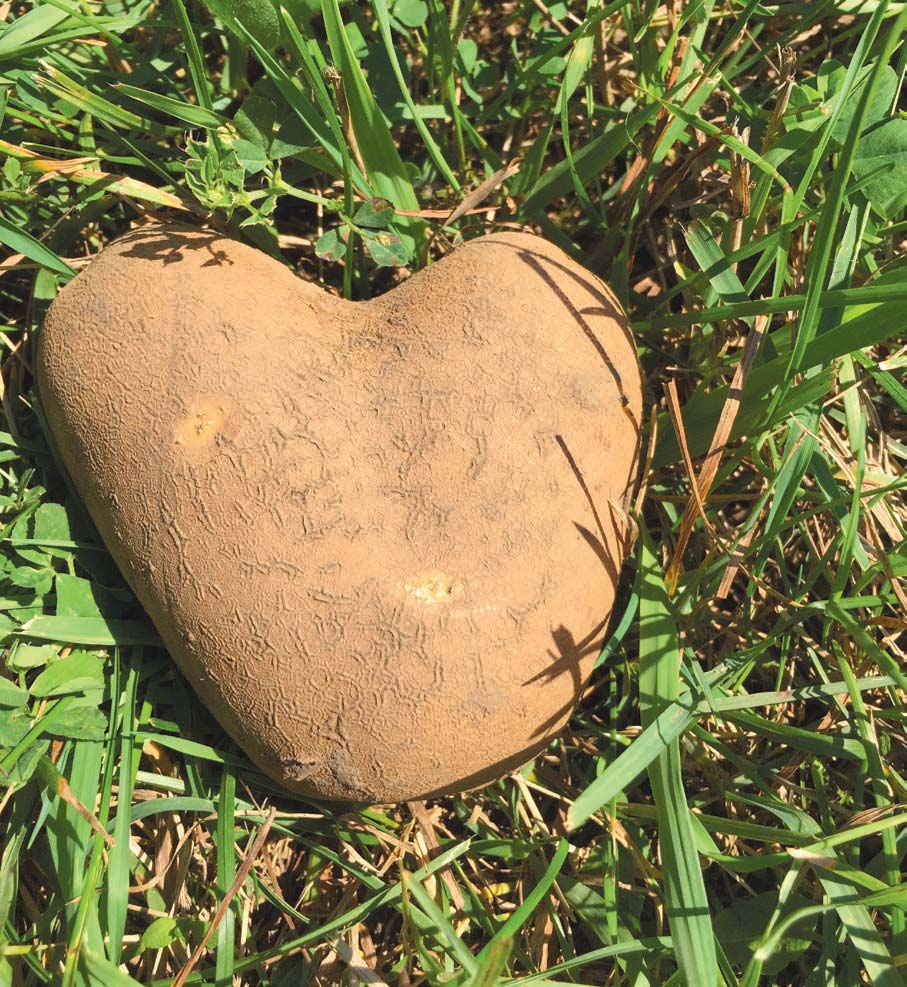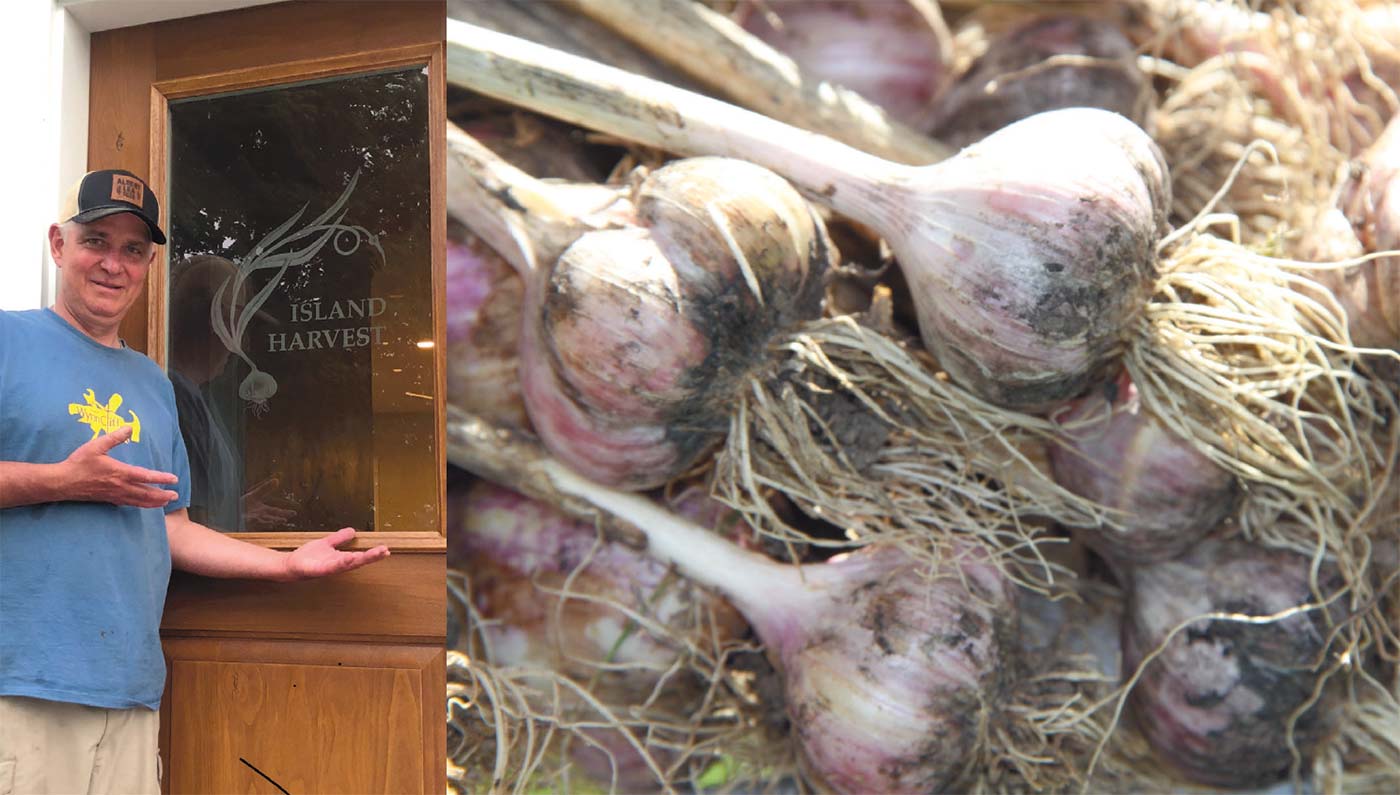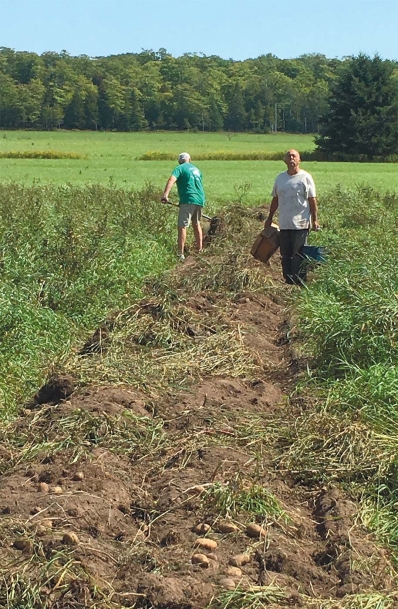Quite the Gardening Plot on the Island
If you ask Bob Atwell, this particular Meet the Farmer story is improperly named.
Atwell’s stature in Northeastern Wisconsin has grown right along with his bank. But there’s another aspect of Atwell that literally has grown equally as well.
Atwell has emerged as one of the most prominent bankers in Northeastern Wisconsin in a relatively short period of time. It was just two decades ago that he partnered with Mike Daniels to create Nicolet National Bank. Now, as its chairman and CEO, he helps oversee Wisconsin’s third largest bank.
But Atwell is much more than a banker. He’s a father of 11 children in a blended family with his wife, Sally. He also happens to be a farmer.
When asked how he became a farmer, he says with a smile, “I am more like a lifelong gardener.”
He has far too much respect for the time and effort that goes into this noblest of professions to qualify for such a title. “I’m not tough or skilled enough to be a farmer but I do possess the ability to realize that I can do something else.”
But Atwell’s unwillingness to assume the title of farmer doesn’t mean that he isn’t as devoted to growing things and, on the surface, it would appear that he may have chosen one of the most unforgiving locations to practice the craft.
Except for the famed fruit orchards, the northern reaches of the Door Peninsula aren’t considered prime agricultural land. Thin soil has produced one of the most impressive expanse of rock fences in the state, but a lesser known commodity enjoyed success on one of the many islands in Door County.
Washington Island, the largest of the more than 30 islands, became known for its potato harvest. It’s a tradition Atwell continues on the three acres of the land he and Sally own.
“The land is actually good for growing some crops,” said Atwell. It’s good enough to produce 12,000 pounds of potatoes but he also said he and his crew mix in some tomatoes, asparagus, onions and strawberries.
While Atwell may not call himself a farmer, he does have roots in the profession. “My grandfather was a seedsman,” he said. That means he sold seed at Albert Lea Seed in Albert Lea, Minnesota. And while that may not help to differentiate Atwell’s status as a farmer or a gardener, it did instill in him the appreciation for the importance of producing locally-grown produce.
“Many people have a garden in their back yard,” he said. “I think it’s part of our Midwestern ethic. Ours seemed to grow as the family grew.”
“I’m not tough or skilled enough to be a farmer but I do possess the ability to realize that I can do something else.” – Bob Atwell

A product of Bob Atwell's love for growing things. Contributed photo
BANKING ON BANKING
That growing family coupled with an inadequate garden pushed Atwell to find a profession in which he could thrive. He eventually found it in banking.
“It took me a while to figure out what I loved about banking but I think I figured it out,” he says with a sly smile.
A trip out east confirmed what he pretty much already knew: He wanted to come back to the Midwest, and after a 13-year stint with Associated Bank, he and Daniels planted an idea.
“I was 42 years old with lots of ambition and couldn’t really tell at that point if it was a bad idea,” said Atwell. That was 2000 and rapid growth ensued, the biggest growth spurt coming when the Green Bay-based bank merged with Baylake Bank centered in Sturgeon Bay.
Still, with much of his attention focused on his bank, perhaps gentleman farmer might apply to his agricultural exploits?
He smiles and shoots back, “Catch me on a bad day and I’m not much of a gentleman.”
Call it an ambitious hobby as the Atwells made the move from backyard gardeners to what can only be described as a farming operation when they purchased the Washington Island property in 2013.
It’s an effort that reaps rewards well beyond the produce truck at Island Harvest, as the Atwells call the farm. It involves paid youth working with a couple of his own kids along with a hired manager. “It’s a group thing,” said Atwell. “We love the young people.”
Meanwhile, it is hoped Island Harvest will shrink the shortage of locally sourced food on the Peninsula.
“We service some local restaurants on the Island and the northern peninsula,” said Atwell. “But I really want to also highlight the Island farmers market on Wednesday afternoons and Saturday mornings. The market actually comprised about one-third of our sales and together with three other growers has really addressed the dearth of local produce.”
But the short growing season limits the operation.
“The window is very narrow,” he added. To that end, Island Harvest has built a greenhouse to get a start on the season that provides produce as early as June.

Island Harvest is nothing more than an outsized garden project to Bob Atwell. RIGHT: The Island’s soil is suited for a variety of crops. Contributed photos
THE POTATO LEGACY
The 12,000 pounds of potatoes may be a far cry from the heydays of potato farming on the Island. Potatoes date back to the late 1800s when as many as 80 farmers tended to plots between 2-10 acres. Then Edward Anderson came along.
The Chicago potato broker bought property on the Island to grow his own crop.
Nothing reflected that more than the two large potato boats that stayed moored on the Island for a number of years after Anderson’s operation shut down in the late 1960’s. But as Island historian Richard Purinton pointed out, the farm was still posting a $150,000 profit as late as 1965, according to farm accounting books.
The Door County Advocate reported that in 1959 Anderson’s Island crop on 500 acres amounted to a quarter-million bushels of Russett Burbank potatoes which, when the going rate of $5.50 per 100-pound bag is factored in produces roughly $660,000.
“Anderson said his only problem in selling is to get the customer to try his Wisconsin Russet Burbanks once,” wrote the Advocate. “If they do, they're convinced. Idahos have a mighty reputation but they apparently don't stand up in comparison with Island spuds. The Burbanks are just as good baked and don't disintegrate when boiled.”
But it doesn’t take long when talking to Atwell that despite his impressive financial resumé, the success of the farm seems to have little to do with dollars and cents.
“My major hobby is growing things,” he says, making his mission in life pretty clear — whether it’s a bank addressing the needs of the community, helping introduce youth to a more sustainable future or filling a need with more local produce from his bigger than normal garden.





